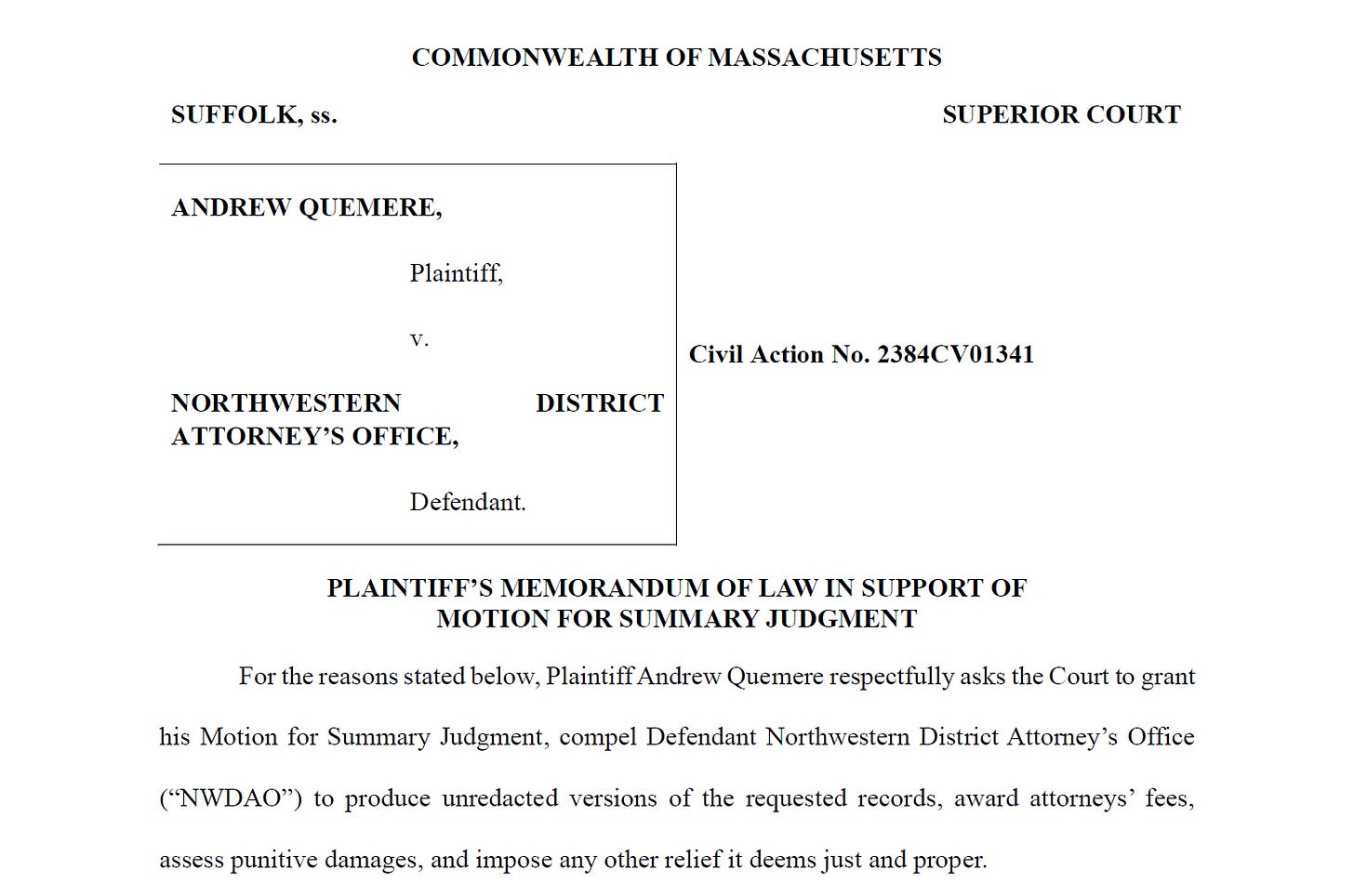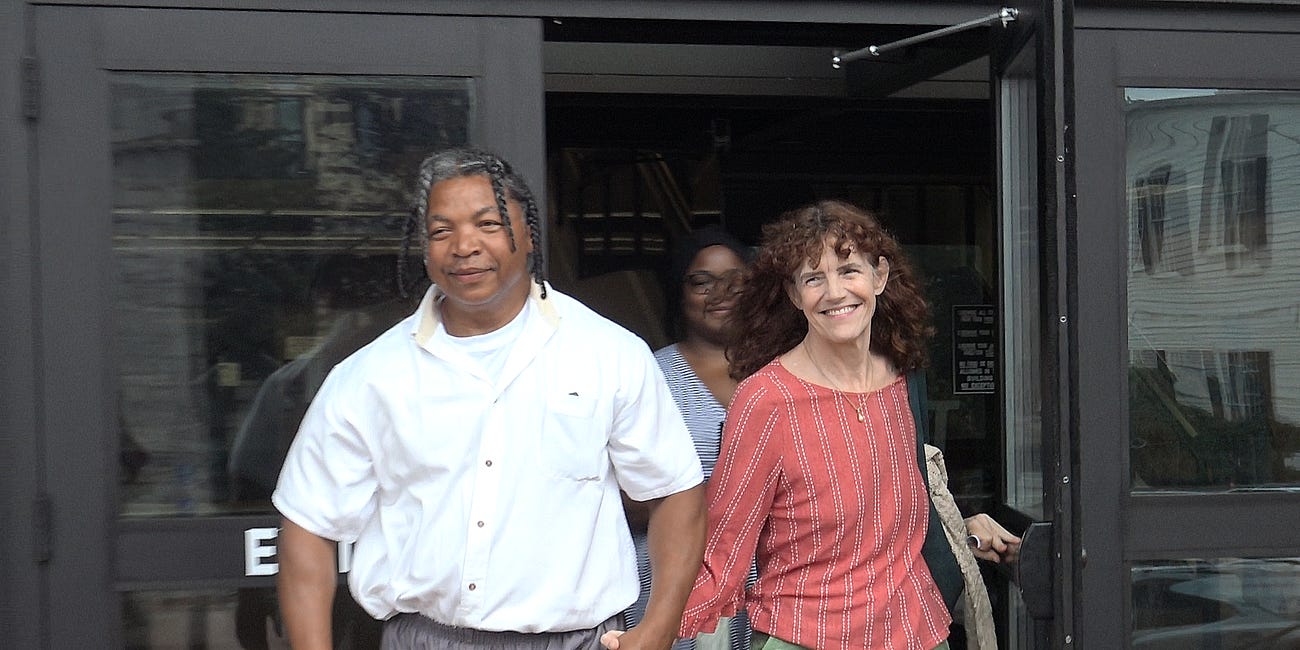Mass Dump seeks ruling that Northwestern DA can’t hide names of cops charged with crimes
Northwestern DA David Sullivan spent tax dollars on private law firm to fight against police transparency in Massachusetts
The Mass Dump on Monday asked a judge to order Northwestern District Attorney David Sullivan’s office to disclose the names of police officers who have been charged with crimes like possession of child pornography, assault and battery, and driving under the influence.
Prosecutors have insisted for years that they must keep the names of the accused officers secret under a law intended to protect some information about people’s criminal records, which led the Dump to file a lawsuit in June 2023. In motions filed in Suffolk County Superior Court this week, both parties requested that the case be resolved by summary judgment, meaning the judge would reach a decision without holding a trial.
Suffolk County Superior Court Judge Julie Green scheduled oral arguments in the case for December 1, according to court records.
The legal dispute dates back to January 2022, when the Dump sent the district attorney’s office a public records request for Brady disclosures about police officers. These documents are used by prosecutors to inform defendants about alleged misconduct by officers testifying against them. Prosecutors are required to make these disclosures so that defendants can challenge the officers’ credibility in court.
Sullivan’s office provided copies of the Brady disclosures but blacked out the names of officers who had been charged with crimes, citing the state’s Criminal Offender Record Information (CORI) law. His office also removed docket numbers that were associated with the officers’ criminal cases and with the cases in which the officers were potential witnesses. Docket numbers are identification numbers that courts assign to cases; the public can use them to look up and obtain court records related to those cases.
In the Dump’s motion, it argues that releasing the unredacted Brady disclosures is required by the Massachusetts Public Records Law and would allow members of the public to “judge for themselves whether relying on these officers [as witnesses in criminal cases] ultimately supports or undermines the administration of justice in the Commonwealth.”
After the Dump went to court, Sullivan’s office hired private legal counsel to fight the lawsuit at taxpayer expense. In Sullivan’s motion, his lawyers argue that if the district attorney’s employees were to provide the unredacted Brady disclosures, they could be prosecuted under the CORI law.
The lawyers write that by releasing the records in redacted form, Sullivan’s office “deftly threaded the legal needle of maximum transparency as dictated by the public records law against a criminal prohibition.”

In a July 2023 radio interview, Sullivan said that the Dump’s request was overbroad and had sought “criminal records of any police officers, whether it was minor or major, going back even before they were police officers” and might be “something that’s not even relevant to their police work.”
However, in the Dump’s motion, it writes that its request “only sought records that [Sullivan’s office] itself determined may be relevant to [an] officer’s ability to testify in court.”
The Massachusetts Supreme Judicial Court has already ruled that prosecutors must disclose docket numbers in response to public records requests, according to the Dump’s motion. In a 2003 case cited by the Dump, the high court ruled that district attorneys were required to release docket numbers after The Boston Globe requested information about cases of alleged corruption by local officials over a five-year period.
The SJC determined in that case that docket numbers fall within an exception to the CORI statute for “chronologically maintained court records of public judicial proceedings.” The SJC found that requiring the release of the docket numbers would not undermine the purposes of the CORI statute, writing that the law was not intended to “shield officials in the criminal justice system from public scrutiny.”
But Sullivan’s lawyers did “not even cite, much less address,” the 2003 case in their own motion, according to a reply by the Dump.
Sullivan’s lawyers argue that the names and dockets numbers of anyone charged with a crime are exempt from disclosure, citing a 2020 SJC ruling. In that case, the justices found that prosecutors could redact defendants’ names and docket numbers in response to a request for the data from their internal case-management systems.
However, the Dump notes that the 2020 case involved a request for what the SJC described as “vast amounts of personal data” that would allow someone to compile people’s complete criminal histories and undermine the purpose of the CORI law.
The Dump argues that, unlike in that case, it requested information about a limited number of cases involving a limited number of defendants. The docket numbers for these cases would not allow a person to compile complete criminal histories for anyone, and therefore disclosing them would not undermine the CORI statute, the Dump argues.
“Cost is Ultimately on the Public”
In July 2023, Sullivan’s office retained the Boston-based private law firm Butters Brazilian to defend it against the lawsuit. The district attorney’s office agreed to pay $350 an hour each for two lawyers and $75 an hour for the work of clerks and paralegals, according to an agreement obtained by making a public records request.
Butters Brazilian has billed taxpayers $13,454.17 for work related to the case as of July 31, according to invoices released by Sullivan’s office. Those records do not include the charges for the final draft of the district attorney’s motion for summary judgment.
The Dump is represented pro bono by Mason Kortz, a clinical instructor at Harvard Law School’s Cyberlaw Clinic. Kortz was assisted by students from the law clinic.
“I’m grateful that our students were able to get firsthand experience with litigating in the public interest,” Kortz said. “Unfortunately, those students also saw how easy it is for government agencies to deny and delay efforts at transparency.”
If Sullivan’s office loses the lawsuit, the court could order it to pay the Dump’s legal expenses.
The Dump has also asked the court to rule that Sullivan’s office acted in bad faith by redacting the Brady disclosures. If the court makes that finding, it could order Sullivan’s office to pay up to $5,000 in punitive damages to the Public Records Assistance Fund, which the state legislature created “to provide grants to municipalities to support the information technology capabilities of municipalities to foster best practices for increasing access to public records,” according to state law.
“Even though we expect the district attorney’s office to pay attorney’s fees and a substantial fine at the end of this process, that cost is ultimately on the public,” Kortz said.
Sullivan implied in the 2023 radio interview that his office will appeal if it loses the case, which would add to the burden on taxpayers.
“If it’s got to go up to the Supreme Court for them to make that decision whether the Public Records Law overrides the CORI law, then we’ll let the Supreme Court decide,” he said.
When the Dump requested the Brady disclosures in January 2022, Sullivan’s office initially blacked out the names of every police officer, whether they had been charged with crimes or faced internal investigations for alleged misconduct.
At the time, Sullivan’s office argued that all the names were protected by the personal privacy exemption to the Public Records Law. In 2020, prior to the Dump’s request, the state legislature updated this exemption to explicitly say that it “shall not apply to records related to a law enforcement misconduct investigation.”
In May 2024, Sullivan’s office agreed to provide the Dump with the names of officers who faced internal investigations. The reversal came about only after the SJC ruled in a separate case that the Bristol County District Attorney’s Office couldn’t invoke the privacy exemption to conceal records related to a misconduct investigation of a fatal police shooting.
However, Sullivan’s office maintained that the names of officers charged with crimes and the docket numbers were still exempt from disclosure because of the CORI statute.
Before going to court, the Dump filed three administrative appeals with the state’s supervisor of public records. Each time, the supervisor found that Sullivan’s office had failed to justify redacting the names and docket numbers—and each time, Sullivan’s office refused to provide the unredacted records.
Kortz said the case highlights the fact that the Public Records Law provides “little incentive to comply voluntarily,” allowing government agencies to violate it without fearing consequences.
“Many requesters cannot find—or cannot afford—counsel for an extended legal battle like this,” he said. “We hope that this case will encourage other agencies to follow the law instead of banking on requesters’ inability to go to court.”
Thanks for reading! Investigative journalism like this takes a ton of time, energy, and care. If you’d like to keep The Mass Dump running, please consider offering your financial support, either by signing up for a paid subscription to this newsletter below, becoming a Patreon supporter, or sending a tip via PayPal or Venmo. I rely on your support to keep doing this work, and a monthly subscription is just $5!
Even if you can’t afford a paid sub, please sign up for a free one to get updates about this story, and please share this article on social media.
You can follow me on Bluesky and Mastodon. You can email me at aquemere0@gmail.com.
If you haven’t read it yet, please check out my recent reporting on Edward Wright, who spent 41 years in prison for murder until a judge overturned his conviction after finding that prosecutors withheld key evidence and a police officer gave false testimony.
“I just want to heal”
Edward Wright spent 41 years in prison after he was convicted of murder. But a judge overturned his conviction after learning prosecutors withheld important evidence.
Anyway, that’s all for now!




Good for you!!!!
Keep fighting the good fight! TRANSPARENCY is good for ALL of us!